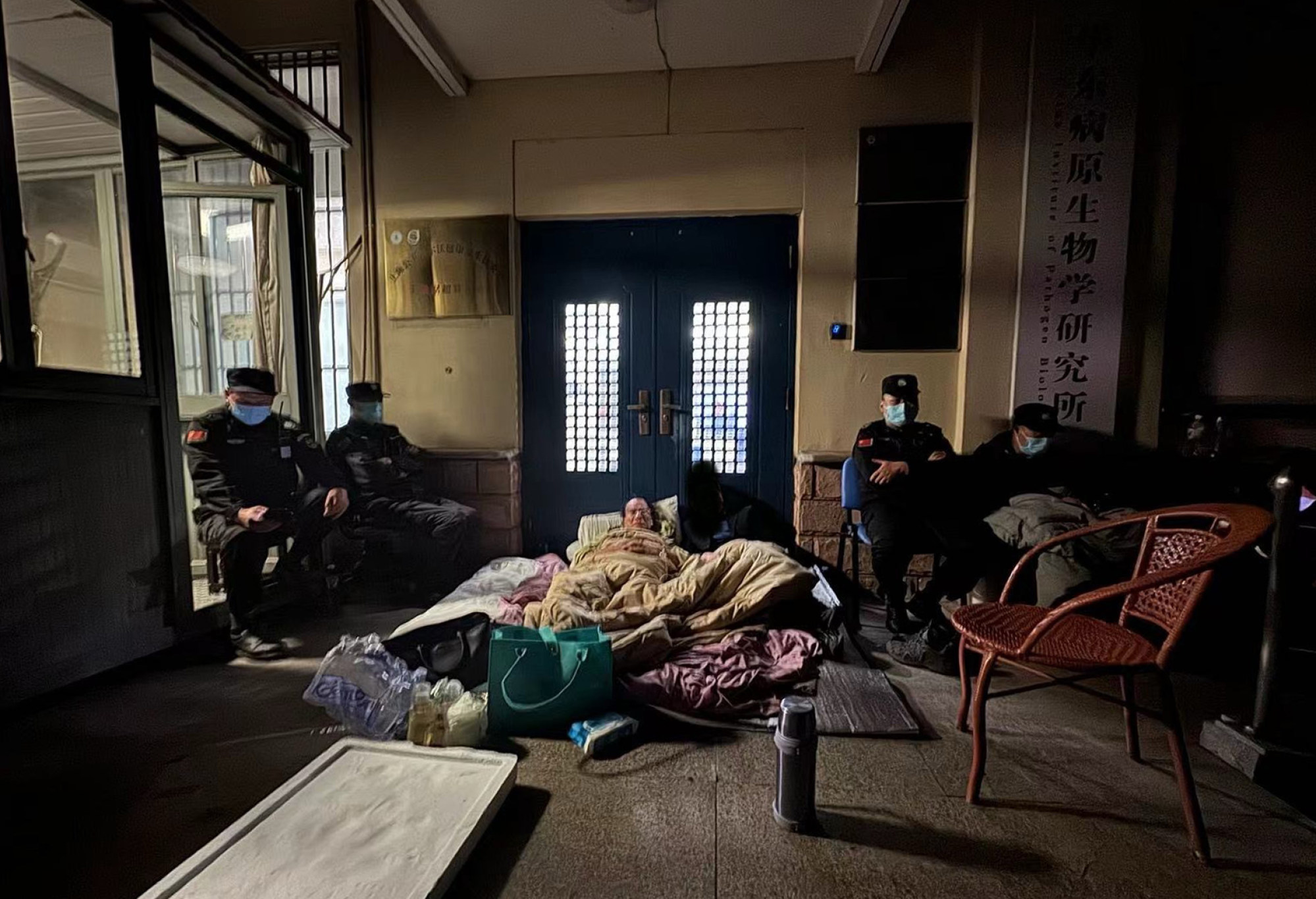
Chinese scientist who first shared Covid-19 genome data sparks sympathy after lab closure battle
- Virologist Zhang Yongzhen, who camped outside his Shanghai lab after parent hospital shut him out, has provoked wave of public sympathy and questions
- Man on Nature magazine’s 10 most influential people list in 2020 has ‘faced obstacles’ since releasing Covid genome sequence without approval.
Zhang Yongzhen, 59, spent two nights sleeping outside his lab in protest after he was refused entry on Sunday, with parent hospital Shanghai Public Health Clinical Centre citing “renovation plans”.
On Wednesday, he said he and his team had been allowed back into the facility “for the time being”.
“It has been tentatively agreed to let normal research be resumed in our lab, and team members are now free to enter for the time being,” Zhang posted on Chinese microblogging platform Weibo early on Wednesday morning.

However, he added that the future relocation of the laboratory, his students’ research, and the collaboration between his team and the health centre were “pending issues that will be further communicated and resolved”.
In January 2020, Zhang published a genomic sequence of Sars-CoV-2, the coronavirus behind the then emerging Covid-19 pandemic. His data was based on patients in China’s central city of Wuhan, where the outbreak was first detected.
His publication of the data helped to speed up the development of Covid -19 vaccines and is believed to have indirectly saved many lives.
However, it had come without government approval, and the scientist named by Nature magazine in 2020 as one of the world’s 10 most influential people of the year found his career then taking a turn for the worse.
Lab that first shared coronavirus sequence closed for ‘rectification’
In a Weibo post on Sunday, a user claiming to be a student of Zhang said the team’s work had been repeatedly obstructed by the Shanghai Public Health Clinical Centre several times over the past few years, including research to trace the origins of the Covid-19 virus. The post has since been deleted.
The South China Morning Post has been unable to independently verify the allegation. When contacted by phone on Thursday, the centre said its administrative staff were on holiday. China began a five-day Labour Day break on Wednesday.
On Monday, Zhang said on Weibo that his team had suddenly been told that the laboratory needed to be “upgraded” and that they had been barred from entering the facility since Sunday morning. That post was also later deleted.
Zhang’s students said on social media that he sat-in outside the lab from Sunday night until he was allowed to enter late on Tuesday.
Photos published by mainland media showed security guards stationed outside Zhang’s lab at one point, blocking all entry.
The photos quickly sparked widespread discussion and sympathy on social media, topping the hot search list for a while on Weibo.
“Is this how Shanghai treats researchers?” read one comment that garnered thousands of likes.
Another popular comment said it was “immoral” to let “someone who has done nothing wrong” sleep outside.
Several mainland media articles based on interviews with Zhang were read more than 100,000 times.
In a statement on Monday, the Shanghai Public Health Clinical Centre said some of its laboratories needed to be renovated and were “closed for construction work for safety reasons”.
Zhang’s team had been provided with “alternative office and laboratory space”, it said.
But Weibo posts by Zhang and his students asked whether the team’s lab – which was carrying out a number of virus research projects – might not pose a potential biosafety risk if it was moved in a hurry.
Fan Xiaohong, party secretary for the government-funded Shanghai centre, told Chinese media on Tuesday that Zhang’s contract had expired but “he refused to leave”.
Zhang countered that claim, saying in a social media post the same day that although his contract with the centre officially ended last year, those of his team members had been renewedand they were still owed “research funds” and “paper bonuses” for published academic papers.
Zhang was a researcher affiliated to the Chinese Centre for Disease Control and Prevention from 2001 to 2020. He left after he released the Covid-19 virus sequence to join the Shanghai Public Health Clinical Centre as full-time staff, after being associated with it since 2018.
The centre is a hospital affiliated to Shanghai’s Fudan University. According to Fudan’s official website, Zhang is still a researcher at the university’s Institute of Biomedical Sciences.
Zhang’s ordeal drew social media reactions from nationalists and liberals alike.
Hu Xijin, a former editor-in-chief of the nationalist tabloid Global Times and one of the most prominent defenders of Beijing’s policies, said on Monday that Zhang’s conflict with the Shanghai health centre was “very strange”.
Neither Zhang nor the statements from the Shanghai centre made any mention of Zhang’s disclosure of the coronavirus genome sequence four years ago, but some web users critical of Beijing’s policies suggested that Zhang was being penalised for having “pierced the official lies” at the time.

